Shechen Rabjam Rinpoche
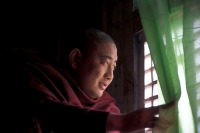
Rabjam Rinpoche 2025 Public Teaching Schedule https://shechen.org/2025/02/rabjam-rinpoche-public-teaching-schedule-2025/
Shechen Rabjam Rinpoche, born in 1967, is the grandson and spiritual heir of Dilgo Khyentse Rinpoche. Since his grandfather’s passing in 1991, Rabjam Rinpoche has taken the responsibility of transmitting Dilgo Khyentse Rinpoche’s teachings, and is bringing his vision for the preservation of Tibetan Buddhist teaching and culture to fruition.
Rabjam Rinpoche is the seventh in the line of the Rabjam succession. The second Rabjam Rinpoche founded Shechen Monastery in Kham, eastern Tibet. The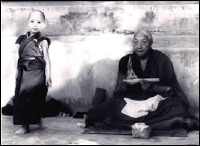 monastery became one of the six main Nyingma Monasteries in Tibet but was destroyed in the mid-twentieth century. At the age of three, Rabjam Rinpoche began taking teachings from his revered grandfather and today holds this unbroken lineage. He was raised by Dilgo Khyentse Rinpoche and attended almost every teaching, drupchen (9-day ceremony), and empowerment that he gave during twenty-five years. He traveled throughout the world with Khyentse Rinpoche and first visited the West in 1976.
monastery became one of the six main Nyingma Monasteries in Tibet but was destroyed in the mid-twentieth century. At the age of three, Rabjam Rinpoche began taking teachings from his revered grandfather and today holds this unbroken lineage. He was raised by Dilgo Khyentse Rinpoche and attended almost every teaching, drupchen (9-day ceremony), and empowerment that he gave during twenty-five years. He traveled throughout the world with Khyentse Rinpoche and first visited the West in 1976.
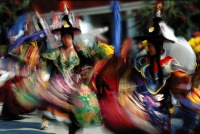 In the early 1980’s Dilgo Khyentse Rinpoche built Shechen Tennyi Dargyeling Monastery in Nepal and established Rabjam Rinpoche as its abbot. Today, there are 450 monks studying and practicing there under his guidance. Rabjam Rinpoche has created an administration and organization within the monk community that is a model of education, joyful discipline, and humanitarian activity.
In the early 1980’s Dilgo Khyentse Rinpoche built Shechen Tennyi Dargyeling Monastery in Nepal and established Rabjam Rinpoche as its abbot. Today, there are 450 monks studying and practicing there under his guidance. Rabjam Rinpoche has created an administration and organization within the monk community that is a model of education, joyful discipline, and humanitarian activity.
Rabjam Rinpoche established the Shechen Philosophical College and the Shechen Retreat Center in Nepal. In response to the needs of women wanting to practice 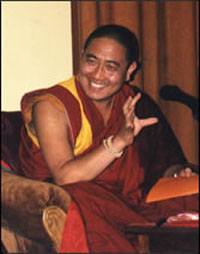 and study in the lineage of Dilgo Khyentse Rinpoche, he rebuilt and improved the facilities of the Sisinang Nunnery in Bhutan where 180 nuns of all ages study and practice. In accordance with the wish of Dilgo Khyentse Rinpoche, he built a small Nyingma monastery and study center in Bodhgaya, India.
and study in the lineage of Dilgo Khyentse Rinpoche, he rebuilt and improved the facilities of the Sisinang Nunnery in Bhutan where 180 nuns of all ages study and practice. In accordance with the wish of Dilgo Khyentse Rinpoche, he built a small Nyingma monastery and study center in Bodhgaya, India.
Rinpoche maintains an active interest in the preservation of Tibetan culture. He has undertaken the completion of the stupas for peace project. Shechen Monastery in Tibet was renowned for its particular style of cham (sacred dance) and performance of rituals and chant. Rabjam Rinpoche is revitalizing that tradition. Under his leadership, the Shechen Dancers have performed throughout Europe and South America. In an effort to preserve the tradition of sacred painting, he created the Tsering Art School. His book, The Great Medicine, was published in English and other languages.
Rabjam Rinpoche’ has an acute interest in humanitarian projects. He is maintaining the authentic Tibetan Buddhist tradition as taught to him by his grandfather in combination with a modern interest in the needs of the community and its individuals.
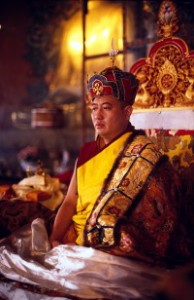
He is the president of the Shechen School, an impressive school that goes from Pre-K to a high school diploma. The 240 students study a secular and spiritual education.
Long Life Prayer for Shechen Rabjam Rinpoche
OM SOTI
TAGTEN SHOM SHIG DRELWA DORJÉ KU
TSANG YANG GAGPA MÉPA DORJÉ SÜNG
ZAGDREL DÉTONG DORJÉ TÜG NGA WÉ
TSASÜM TSÉLHÉ TSOGKYI GELEK TSOL
KUNSANG PEMÉ RINGLÜG DZOGPA CHÉ
TENPÉ NYIMA TSÜNGMÉ RABJAMPA
SHÉDRÜG CHÖKYI SENGGÉ DADREL CHOG
SANGSÜM DORJÉ KAMSU TENGYUR CHIG
DONGAG TENPA NYIDEN NGYURMIG DÉ
DÉSÖ GYALTSEN TSÉ NA TAGTEN SHING
KORLO SÜMGYI TRINLÉ DARSHING GYÉ
NYENDRAG DZAMLING YONGLA KYAB GYUR CHIG
OM SVASTI
Vajra body, indestructible, permanent and firmly abiding,
Vajra speech, unceasing melody of Brahma,
Sovereign of the stainless vajra mind of empty bliss —
May the deities of the Three Roots grant you virtuous excellence!
Universally Learned One, sunlight of the teaching of
Samantabhadra and Padmasambhava’s tradition of Mahasandhi;
Supreme and unequaled Dharma Lion of its study and practice,
May your three secrets remain firm as a vajra.
As you remain the pinnacle of the victory banner of the faith and merit
Of the saffron clad followers of the sutra and tantra teachings,
May the three spheres1 of your activity increase and flourish,
And may your fame spread throughout the entire world!
The original prayer by the old Shakya bhikshu Orgyen Tukchik Dorje Tsewang Drunpey Gonpo, was adapted for the purpose of the [present] incarnation. Siddhi Rastu. Virtue!
(Translated by Jakob Leschly)
1 1) The study sphere of learning. 2) The renunciation sphere of meditation. 3) The action sphere of activity for the Dharma.

